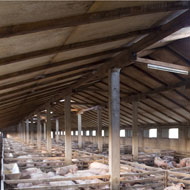Pig producers urged to cull under-performers immediately

Experts have calculated that 10 extra empty days per litter costs £27,000 a year for a 500-sow herd.
Pig producers struggling with low prices are urged to cull non-productive sows immediately.
Ciarán Carroll, head of Teasgac’s pig development department, calculated that 10 extra empty days per litter costs £27,000 a year for a 500-sow herd. One of these empty days costs £2.20.
Speaking to UK pig producers during AHDB Pork’s webinar on ‘getting through tough times,’ Ciarán said: “Producers need to continually monitor sow performance and make sure they cull under-performers immediately, don’t try to restore condition.”
He added that in the finishing herd, where 60 per cent of all feed costs is attributed, cost savings can be made by minimising feed wastage.
He suggested that farmers keep feeders in good repair and adjust them regularly so that the trough is not full of stray feed. This will also minimise wastage and maintain the correct stocking rate with pigs per feeding place.
According to Ciarán, a four per cent reduction on finisher feed wasted is worth £1,55 per pig, which adds up to £19,000 for a 500 sow herd.
He suggests that farmers examine slaughter weights, farm energy use and look into loan or overdraft options to help weather the storm.
Experts at AHDB Pork believe that a price recovery is possible later in the year, but stress that the scale and pace of this is uncertain.
Meanwhile, Ciarán advises producers to accurately measure and monitor their herd to keep focused on what they can control.
To listen to the full webinar go to pork.ahdb.org.uk/events/ahdb-pork-webinars/.
For more information on managing production costs and for details of forthcoming regional on the topic go to the ‘tackling the tough times’ area on the AHDB Pork website.



 The Veterinary Medicines Directorate (VMD) is inviting applications from veterinary students to attend a one-week extramural studies (EMS) placement in July 2026.
The Veterinary Medicines Directorate (VMD) is inviting applications from veterinary students to attend a one-week extramural studies (EMS) placement in July 2026.